2018 Goldfinch Standard
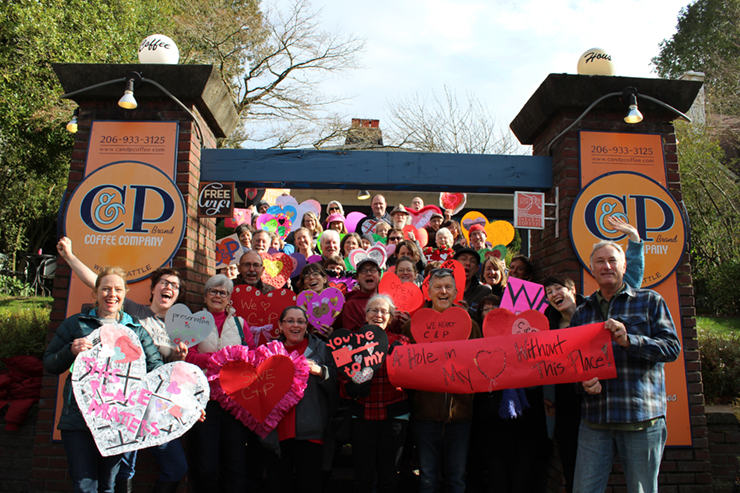
The February 14 “heartbomb” event at C&P Coffee, hosted by Historic Seattle.
Best moments in preservation from 2018
C&P Coffee Saved by the Community
In January last year, it was announced that the Arts and Crafts bungalow housing C&P Coffee would be put up for sale for $1.25 million. Located along California Avenue SW in West Seattle with current zoning that allows for multi-family housing and a building height of 30 feet, the property was listed as a “terrific development opportunity” in anticipation of a proposed upzone to 40 feet by the City of Seattle. The property quickly went under contract with a buyer, a developer that indeed planned to demolish the bungalow. The community knew that if they didn’t act fast, the historic bungalow and the community space it created would be lost and a beloved local business would be displaced. Luckily the lease for the building held by the coffee shop owners, Cam and Pete Moores, gave them right of first refusal: if they could match or exceed the buyer’s offer, then the property would go to them. The Moores sprang into action to raise the financing needed to purchase the property with a group of co-investors and started a GoFundMe campaign to ask the community for help. Historic Seattle nominated C&P Coffee to our Most Endangered Places program and hosted a Valentine’s Day “heartbomb” event at the shop – the largest heartbomb turnout to date! Community members not only pitched in on the GoFundMe (raising $77,240!), but also offered their support and expertise to help save C&P Coffee. Amazingly, just two months after the bungalow was listed for sale, the Moores and their partners successfully raised the $1.265 million needed to match the developer’s offer and purchase the property. We didn’t even have time to officially include it as a Most Endangered Place for 2018! The meaning of this incredible achievement was perhaps best summed up by the closing words of Cam and Pete’s letter to the community announcing that they would be able to purchase the property: “Your kindness and commitment has shown us clearly that the coffee house is more than four walls. It is a place where neighbors meet and strangers become friends. It is a place where music and poetry and art are essential. It is a place where social justice is expected and fought for. It is a warm cozy room on a cold day. It is a home. It is YOUR home.”
Big progress at TwispWorks
When the US Forest Service consolidated Methow Valley Ranger Station operations to Winthrop over a decade ago, many thought the Twisp campus was relegated to the history books. But the entrepreneurial spirit of local residents, combined with a generous $1 million loan from an anonymous donor to purchase the property, have given the campus new life! With the loan came a challenge to promote economic vitality in the Methow Valley by reactivating the 6.4 acre campus while creating a financially sustainable business incubator. Since 2009, nearly 45,000 square feet of revitalized space has been created, both in the 17 existing buildings and in newly constructed spaces, which currently houses 35 tenants including over a dozen artists, two schools, light manufacturing, a brewery, and even the local newspaper and radio station! With the loan’s 10-year deadline approaching this coming June, 2018 was a critical year for progress and saw the fulfillment of a $1.5 million capital campaign. This financing will allow TwispWorks to finish renovating or building out the amount of leasable space on campus needed to provide the rental income for TwispWorks to be financially self-sufficient. Construction is underway and when the build out and leasing is complete, TwispWorks will be able to secure the deed to this vital community asset. And the impact of TwispWorks expands well beyond the campus boundaries with programs like Methow Made and the recently established Methow Investment Network. The Methow Investment Network, another important 2018 accomplishment of TwispWorks, provides marketing, business mentorship, and small business loans in the Methow Valley. Stay tuned – we’ll be featuring this momentous achievement in a longer, more in-depth article about TwispWorks later in 2019!
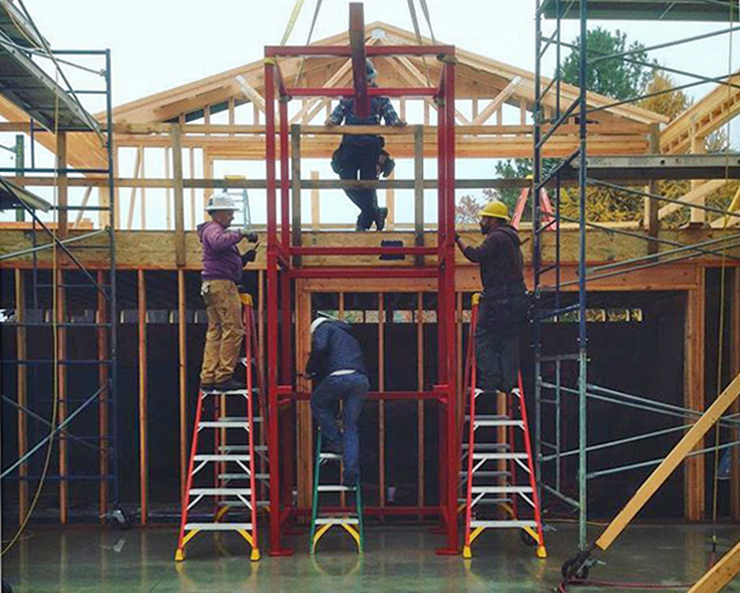
Construction underway on the Twispworks campus on a 5,000-square-foot brewery and taproom leased to Old Schoolhouse Brewery.
Justin Dennis’ Excellence on Main Award
For the first time, an Excellence on Main award was given to someone too young to have a driver’s license. Justin Dennis of Gig Harbor was awarded Washington Main Street’s 2018 Entrepreneur of the Year award for his dedication to developing and promoting his business, “WSU Table Plants by Justin,” which he runs out of his local farmers market. Justin was nominated by the Gig Harbor Downtown Waterfront Alliance, a Main Street program that operates the market where he is a vendor, for his creativity and commitment. His product of succulents planted in used Cougar Gold cheese tins sparked his interest in entrepreneurship, which has blossomed over the last few market seasons. Not only has Justin learned the ropes of starting and managing his own business, but he has actively encouraged others to join him in starting businesses. Since winning the award in April 2018, Justin has expanded his product line, forged partnerships, and created a “Kids’ Farmers Market Booth” open to other young people in the community.
Economic impact front and center at RevitalizeWA
Our annual conference, RevitalizeWA, is one of many opportunities for the Washington Trust to “walk the talk” in terms of community building and economic impact. Utilizing unconventional historic spaces and local businesses are key to this approach, which we modeled in Ellensburg at the 2017 conference and put into full effect in 2018 in Port Townsend. The Port Townsend Main Street Program applied to host the conference in large part because of a major street rebuild that was scheduled for spring and summer 2018. We were grateful and proud that RevitalizeWA 2018 brought over 300 attendees and nearly $140,000 in local economic impact to Port Townsend, boosting merchants during the inevitable hit that comes with construction. Speaking of new models, we were honored that Governor Inslee chose to host his first “on the road” ResultsWA event in conjunction with the conference in Port Townsend, presenting a unique opportunity for his conversation about developing more vital and vibrant communities to take place in the heart of one of Washington’s first Main Street districts.
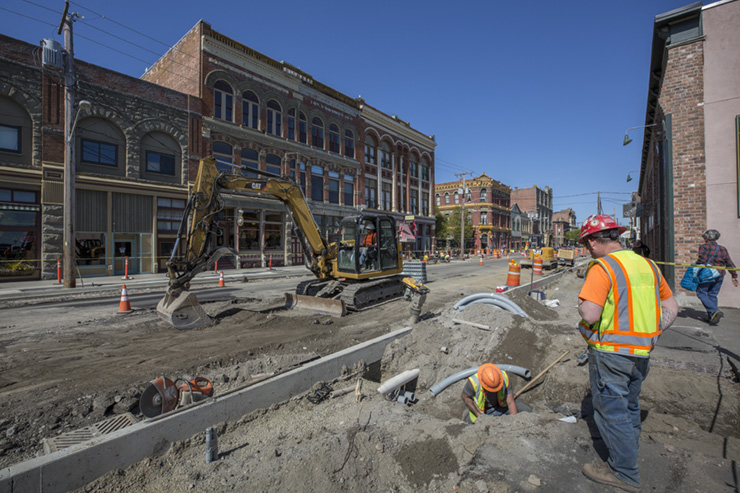
Water Street, one of downtown Port Townsend’s major thoroughfares and home to many local businesses, under construction during RevitalizeWA 2018. Photo by Otto Greule.
Important updates to the Spokane Preservation Ordinance
The Washington Trust had the privilege last year of supporting one of our local partners in advocating for a stronger municipal preservation program. The Spokane Preservation Ordinance underwent some major changes in 2018, including the addition of the ability for the Spokane Historic Landmarks Commission to create local historic districts. While Spokane has several outstanding historic districts listed on the National Register of Historic Places, this designation is honorary only; it is local ordinances that offer protections for historic properties. The new ordinance revisions also allow the Spokane Historic Landmarks Commission to give input through design review for replacement structures if a historic building, individually listed or a part of a historic district, is demolished. The new ordinance language also includes a provision that allows the Commission to deny demolition permits for buildings listed on the Spokane Register or “structures that are listed or eligible to be listed on the National or Local Register of Historic Places located in a downtown overlay zone, and contributing structures in all National Register Historic Districts.” Another important change is the addition of a new criterion for eligibility in the Register that includes properties that represent “the culture and heritage of the city of Spokane in ways not adequately addressed in the other criteria, as in its visual prominence, reference to intangible heritage, or any range of cultural practices.” These, among several other positive updates, give the Spokane Historic Landmark Commission the ability to effectively protect and manage historic resources in Spokane. Thank you especially to the Spokane City/County Historic Preservation Office for negotiating and guiding these changes!
Historic Seattle submits a Showbox landmark nomination ahead of developer
Seattle got a shock earlier this year when it was announced that a developer is making plans for a 44-story tower on the site of the iconic Showbox theater. The community exploded in opposition to the project with the campaign to #SavetheShowbox garnering attention from nationally-known musicians in support of preserving this icon of Seattle’s musical culture. Due to Seattle’s landmark ordinance and environmental review processes, the developer was compelled to nominate the Showbox for landmark status with no intention of preserving it or incorporating the building into their development. To ensure that the Showbox nomination was well-researched and took a nuanced approach to the layered history of the building, Historic Seattle commissioned and submitted a landmark nomination ahead of the developer. This ensures a strong voice for preservation will lead the discussion of the landmark nomination, even though there will be opposition. Thank you to Historic Seattle and their co-nominators, Vanishing Seattle and Friends of Historic Belltown, for seizing the moment by making a gutsy move and beating the developer to the punch.
Wonder Building in Spokane
The former Wonder Bread bakery in Spokane has been undergoing a $12 million renovation this past year, transforming it into offices and an artisan market. The historic bakery building, which made Wonder Bread and Hostess products up until 2000, was purchased in 2017 by Wonder Spokane LLC. Although the zoning would have allowed up to 12 stories on the property, the owners opted to preserve the historic building with an addition on the second floor (restoring part of the building that burned in 1947) and a glassed-in roof plaza on the third floor with views across the Spokane River into Riverfront Park. In an interview with The Spokesman Review, the owners noted that they hope the building “becomes an iconic landmark for the city and for the north side of the river.” As construction is completed, focus will be on getting office tenants moved in (the first tenant officially moved in this past December!) and then work will begin on assembling tenants for the artisan food market.
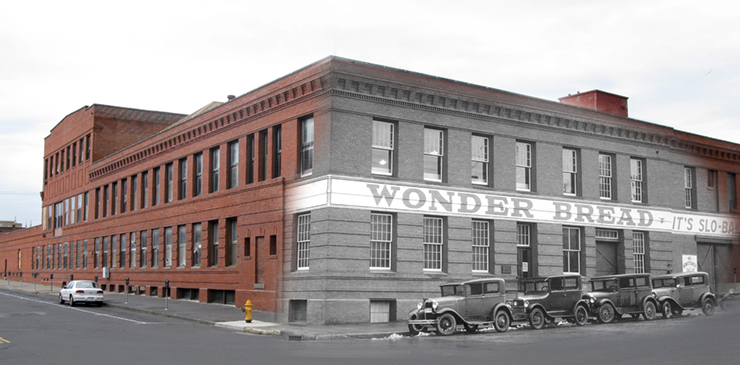
A composite of current and historic (c. 1930) photos of the Wonder Building in Spokane. Photo by Jesse Tinsley from The Spokesman-Review.
Historic Cemetery Preservation Grant Program
2018 saw the first round of grant funding for Washington State’s new Historic Cemetery Preservation Grant Program, established in 2016 with the enactment of House Bill 2637. Any cemetery over 50 years old was eligible to apply for grant funds toward capital projects that would help preserve outstanding examples of historic cemeteries across the state. We received requests totaling over $1.6 million from 47 cemeteries during this first round of the grant program and were able to award 32 grants totaling almost $455,000. We were delighted to see the Governor’s proposed budget include the Historic Cemetery Preservation Grant Program for the upcoming 2019-2021 biennium and hope you will join with us this year as we advocate for the legislature to continue funding this program.
Haller House acquired by Historic Whidbey
For the past six years, Historic Whidbey has been hitting the pavement to raise the needed funding to purchase the historic Haller House in Coupeville. Built in 1866, it is a unique resource because of its early construction date, but also as one of a relatively few structures in Washington State with a direct connection to the Civil War. Historic Whidbey was founded on the premise of saving the Haller House, and in their efforts to do so, the group capitalized on partnerships at all levels. They received funding through private donations from citizens; grants from the National Park Foundation, the National Park Trust, the Norcliffe Foundation, and the Coupeville Lions Club; and a preservation easement purchased by the National Park Service. Despite some seemingly impassable roadblocks along the way, Historic Whidbey never faltered in their ambition to acquire the Haller House. In this way, the group represents the best of grassroots preservation efforts having a positive impact on the community. We’re happy to deem this 2013 Most Endangered Place a “Save!” The resident raccoons who have claimed the attic space as their own may have mixed feelings about this outcome, but the rest of us are thrilled. Now comes fun part – the path toward rehabilitation!
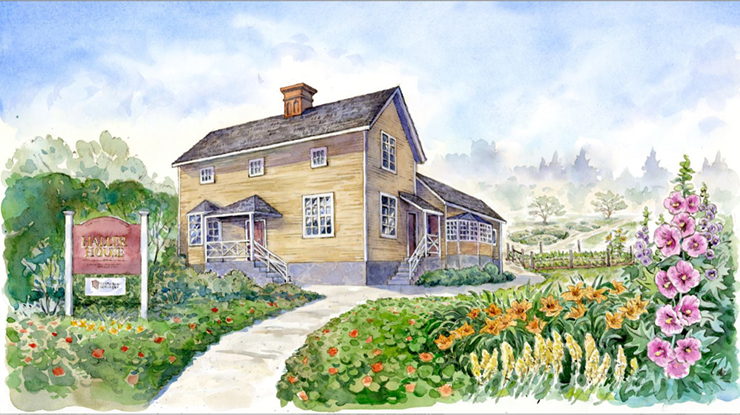
An artist’s rendition of the future of the 1866 Granville & Henrietta Haller House, rehabilitated and re-imagined as part of a Whidbey Island heritage center.
St. Edward Seminary groundbreaking event
In 2012, the Washington Trust included all historic properties within the Washington State Parks system on our list of Washington’s Most Endangered Places. The poster child for this thematic listing was the Seminary in St. Edward State Park, an impressive Renaissance Revival style building that has been largely closed off to the public since State Parks acquired the site from the Seattle Archdiocese in 1977. As the largest underutilized building in the State Parks system with rehabilitation costs far exceeding Parks’ financial capacity, the Seminary was at the forefront of our advocacy efforts. Thankfully, after several years of planning and negotiations, a public/private partnership emerged to adaptively reuse the Seminary as a lodge-style hotel. Led by Daniels Real Estate, the plan required cooperation with Washington State Parks, the City of Kenmore, Bastyr University, preservation advocates, and hundreds of supporters who understood the value of a historic building situated within a state park. The plan even required legislative action to give State Parks the authority needed to negotiate a long-term lease of the site. On December 7 last year, project partners and advocates, including Washington Trust staff and board members, convened at St. Edward State Park for a ceremonial groundbreaking, a culmination of many years of effort and cooperation. Construction is now underway and is anticipated to last two years. The campaign to save the Seminary demonstrates the positive impact of partnership and shared goals. While there were challenges and some disagreements along the way, the great majority of those involved truly believed the building could be saved and worked together toward that end. We can’t wait to celebrate at the grand opening in 2020, and you’d better believe you’ll see this project as a Goldfinch Standard again!
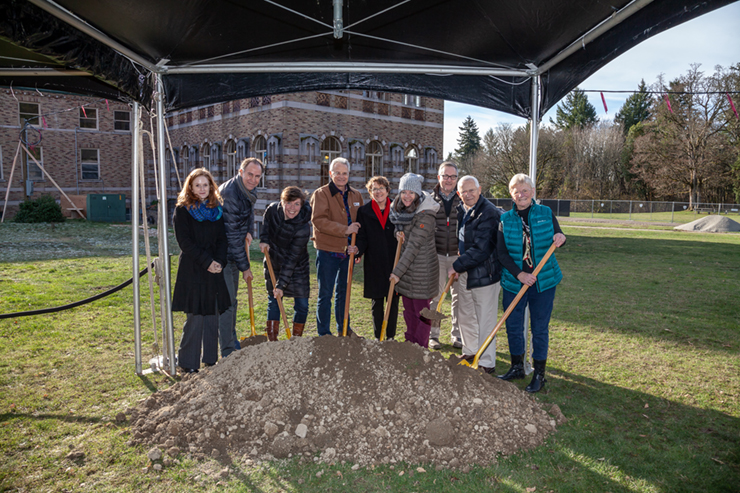
Washington Trust staff and board members (past and present!) at the groundbreaking at the St. Edward Seminary Building. From left to right: Kristy Conrad, Chris Moore, Jennifer Mortensen, Kevin Daniels, Nancy Ousley, Cathy Wickwire, Jeff Murdock, John Lantz, and Pat Lantz.
